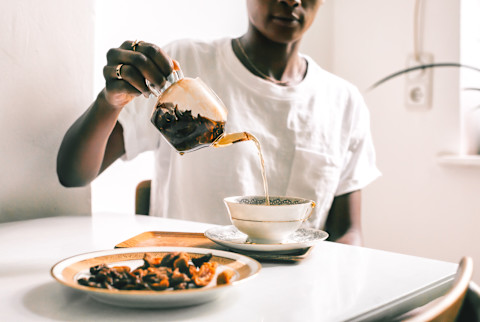3 Immune-Supporting Tips A TCM Practitioner Wants You To Know

For those times you can't run out to see your favorite doctor or energy healer, there are still plenty of ways to reap the immune-supporting benefits of traditional Chinese medicine (TCM). TCM is a 5,000-year-old system that uses tools like acupuncture, acupressure, and cupping to heal the mind and body. Here are three ways you can use the time-tested medicine to support immunity naturally from the comfort of home:
Eat warm food and drinks.
I cannot stress this enough: Our digestive organs need warmth in order to properly function. Peristalsis, the physical movement of your food being pushed along the digestive tract in order to be absorbed, requires muscle and energy. The inside of your body is warm, and your muscles function best when they're warm, too (hence why we do warmups before working out).
When you repeatedly consume cold foods and beverages, the cold temperature puts out the "fire" of your metabolic system. Just imagine what would happen if you hopped in an ice bath right after a long run: Your muscles seize up, contracting and constricting, causing blood flow to slow down.
By swapping out some of the cold, raw veggies and salads in your diet for cooked soups, roasted vegetables, and warm bone broths, you can ease that stress on your digestive system and free up some energy for your immune system.
Spice things up with warming, invigorating Chinese herbs.
To up the warming factor of your foods, you could also throw in some chili pepper, cayenne, cinnamon, or cloves. Here are some more immune-supporting, energizing herbs that are popular in TCM and ideas for how to prepare them:
- Astragalus Root: In TCM, astragalus root (also known as Huang Qi) is used to increase energy, prevent colds and flu, and reduce stress1. Its taste is mild so you can throw it in anything from oatmeal to stews and it won't interrupt your flavoring.
- Turmeric: Traditionally known for its anti-inflammatory effects2, curcumin (the active ingredient in turmeric) has been shown to modulate the activation of T-cells, B-cells, macrophages, and neutrophils, your body's natural immune cells. Try it fresh or dried, add it to a curry, or chew on organic turmeric root while writing emails.
- Honey: This super-sweet alternative to sugar has antibacterial3 and anti-inflammatory4 benefits when it's used in its most organic and raw form. In TCM, we also prescribe honey as an herb to help moisten the lungs in the case of a dry, hacking cough. Try Manuka honey or another high-quality variety. (Darker honey tends to be best since it has a higher polyphenol count.)
- Ginger: Fresh ginger, or Shen Jiang as it's called in Chinese herbal medicine, is used in many herbal formulas that I prescribe to patients who are suffering from chronic illness, impaired digestion, or reduced immune function. Research has found that ginger can help soothe nausea and reduce inflammation5. Throw it in some hot water to sip on all day, or add it to your next stir fry.
- Asian Ginseng: Known as Ren Shen in TCM, Asian Ginseng is another great immune supporter6. It's also high in antioxidants. Use this herb for short periods of time during cold and flu season and then take a break, as it's not meant to be part of your daily regimen.
Let food be thy medicine.
Chinese food therapy divides flavors into five categories, with each one corresponding to different organs, in order to promote balance in the body:
- Sour food is thought to address liver function and ease vomiting.
- Salty food enters the kidneys and is thought to moisten and cool the body.
- Bitter food enters the heart and the small intestine and helps cool heat and dry any dampness (think phlegmy coughs or edema).
- Spicy food enters the lungs and large intestine and helps stimulate appetite and improve circulation.
- Sweet food enters the stomach and spleen and helps nourish the body.
Drawing on this theory, it's best to balance your meals by flavor. A few invigorating, warming ingredients to begin with include pears (sweet), garlic (spicy), almonds (salty), and scallions (bitter), and fermented veggies (sour).
If you're looking for new ways to support your immunity while you're hanging at home, TCM is a great place to start. You may just find this ancient practice was—and still is—a great approach to overall well-being.
6 Sources
- https://www.ncbi.nlm.nih.gov/pmc/articles/PMC5758356/
- https://lpi.oregonstate.edu/mic/dietary-factors/phytochemicals/curcumin
- https://www.ncbi.nlm.nih.gov/pmc/articles/PMC3609166/
- https://www.ncbi.nlm.nih.gov/pmc/articles/PMC5424551/
- https://www.ncbi.nlm.nih.gov/books/NBK92775/
- https://www.ncbi.nlm.nih.gov/pmc/articles/PMC3659612/
